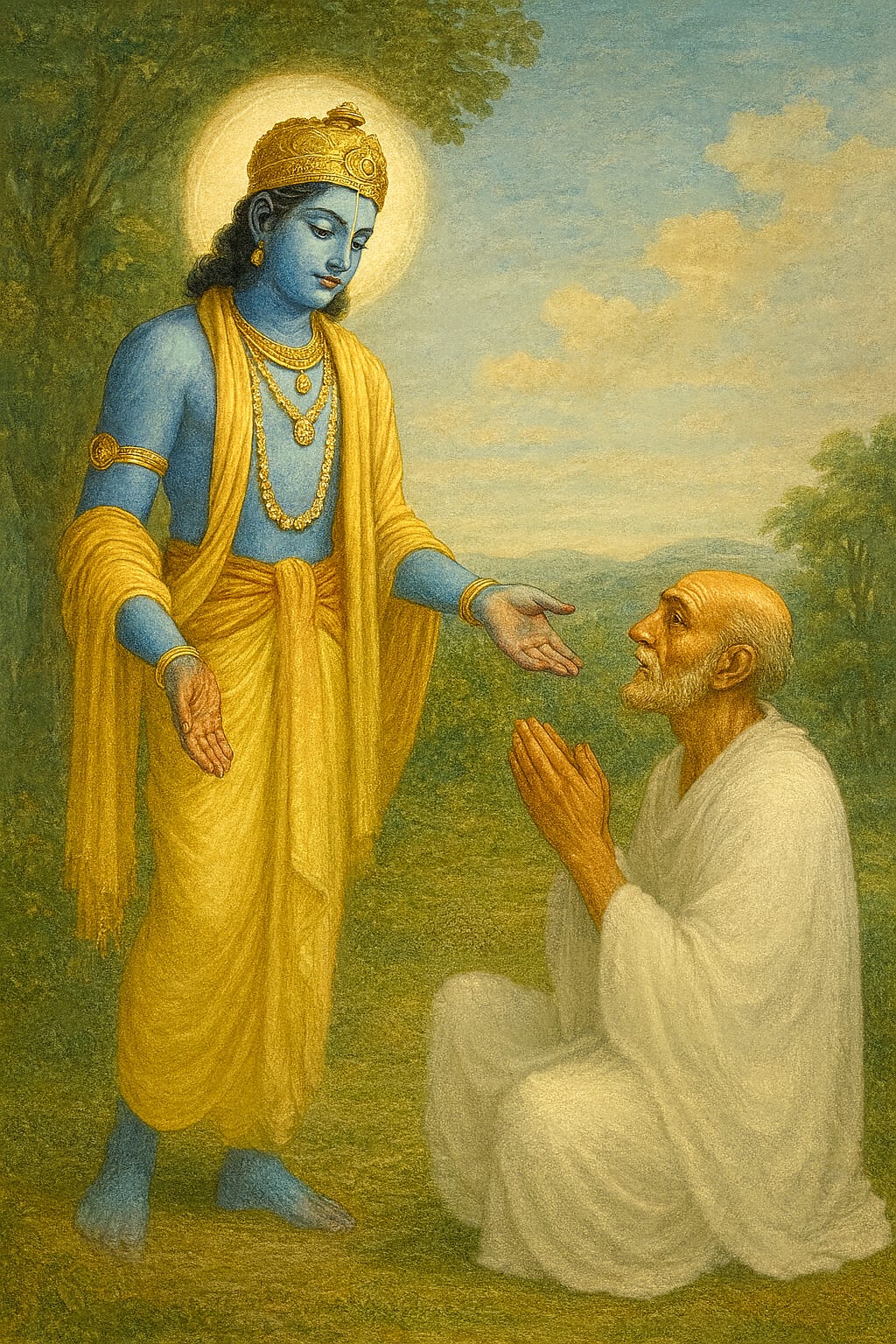If the goal is devotional service, why do the Puranas promise material rewards?
Different Puranas offer great material benefits for one fasting on Ekādasī and so on. One could question why material results are so much emphasized, instead of the spiritual benefits?
The Brahma Vaivarta Purana offers great material benefits for one fasting on Ekādasī and performing other spiritual activities. According to it, fasting on Ekādasī offers liberation from all sins, health and long life, wealth, beauty, and happiness, and the blessing of having children. Similarly, the Padma Purana contains extensive sections glorifying the merits of performing pilgrimage, temple worship, chanting, and fasting on Ekādaśī, promising freedom from disease and poverty, birth in a rich or prestigious family, elevation to the celestial planets, and fulfillment of all material desires. Similar statements can also be found in other Puranas.
The Bhaviṣya Purana, for example, describes the story of King Suketumā, who ruled the city of Bhadravati. He and his wife Śaibya were very pious and virtuous, but were greatly distressed because they had no children. They tried different types of austerities to get a child, but nothing worked. One day, the king went to the forest and met a group of sages who were observing Putrada Ekādasī. They told him that the Putrada Ekādaśī grants a son to anyone who sincerely observes it, together with material piety.
One could question why material results are so much emphasized, instead of the spiritual benefits?
The first point is that it's true: apart from spiritual benefits, one can also derive lavish material benefits from fasting on Ekādasī, visiting the holy places, and even chanting the holy names. Of course, a transcendentalist will be interested in the spiritual benefits, but material benefits are also promised, so people who are after these things can also become interested in doing it. We can see that nowadays many people who are not devotees are regularly fasting on Ekādasī because of health benefits, to get free of karma, etc.
Performing such powerful activities for just material benefits is considered unintelligent, like the allegory of a poor man going to the king to beg for a pile of ashes. If we go to a rich and powerful person to ask for something, we should ask for something of value. On the other hand, often we are just too covered by ignorance to properly understand the value of things, and we may consider material benefits more important than "intangible" spiritual benefits that may come just in the next life, or that we will not be able to use as a currency to buy the material objects we desire.
In the allegory, the poor man begs ashes from the king because that's what he was used to doing. His occupation was to collect ashes from the houses and somehow make his living out of it. That's all he knew, and therefore, when he went to the king, he asked for the same thing, not knowing anything better. The ashes in the allegory are highly symbolic. Ashes represent the end result of all material activity. Bodies, buildings, money, and other material things are eventually all reduced to ashes by the influence of time. Therefore, when we ask for a house, a car, or other material facilities, we are ultimately begging for ashes. However, not knowing the real value of things, that's what we often do out of ignorance and habit.
Still, if we are going to ask something from someone, it is better to go to Krsna. In the Gītā, Krsna Himself explains that four categories of persons approach him. Two are looking for knowledge (the curious and the one looking for knowledge of the absolute), while the other two (the distressed and the desirer of wealth) are looking for material benefits. Still, Krsna describes them as "great souls" because even though desirous of material benefits, they are approaching Him.
One may start by approaching Krsna begging for ashes, and later, as one becomes purified, start to understand the real value of things and ask for tangible things. On the other hand, someone who worships a demigod, or just asks for a boss in exchange for money, will not get the same benefit.
Prabhupada explains that these material benefits are offered in the scriptures as a form of bait to bring materialists to the service of Krsna. The material benefits promised are real, but they are just the secondary benefits. Just as someone who wins a marathon may be given a bag with different trinkets from sponsors, such as t-shirts, caps, and drinks, together with a million-dollar check, all spiritual activities bring both spiritual and material benefits, but the material benefits are secondary, offered just to attract the less intelligent. By getting some ashes, one increases one's faith in the process and gradually comes to understand the real, eternal benefits.
The second point is that the 18 Puranas are divided into three categories, according to the three material modes. The mood of the narration in the Puranas for readers in the mode of passion is different from the Puranas for readers in the mode of ignorance, and both are different from the narrations of the Puranas for readers in the mode of goodness, which in turn are different from the Srimad Bhagavatam, which directly speaks about devotional service.
The Brahma Vaivarta Purana is counted amongst the Puranas for persons in the mode of passion. It describes a path for people coming from the path of fruitive activity, so they can gradually become elevated. In this context, it's easy to understand why it promises material rewards.
It can be noted that even the Srimad Bhagavatam gives material blessings for one who studies different passages. This is also to emphasize that one who follows the devotional path is not deprived of the benefits of lesser paths, as Krsna mentions in Bg 2.46: "All purposes served by a small well can at once be served by a great reservoir of water. Similarly, all the purposes of the Vedas can be served to one who knows the purpose behind them."
As Prabhupada explains in his purport: "The rituals and sacrifices mentioned in the karma-kāṇḍa division of the Vedic literature are meant to encourage gradual development of self-realization. And the purpose of self-realization is clearly stated in the Fifteenth Chapter of the Bhagavad-gītā (15.15): the purpose of studying the Vedas is to know Lord Kṛṣṇa, the primeval cause of everything. So, self-realization means understanding Kṛṣṇa and one’s eternal relationship with Him. The relationship of the living entities with Kṛṣṇa is also mentioned in the Fifteenth Chapter of Bhagavad-gītā (15.7). The living entities are parts and parcels of Kṛṣṇa; therefore, revival of Kṛṣṇa consciousness by the individual living entity is the highest perfectional stage of Vedic knowledge."
If you read this article to the end, give it a like. This makes Substack recommend it to more people.
Read also:





